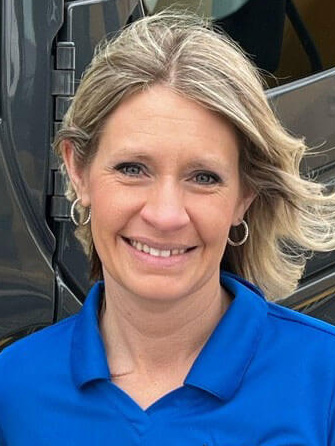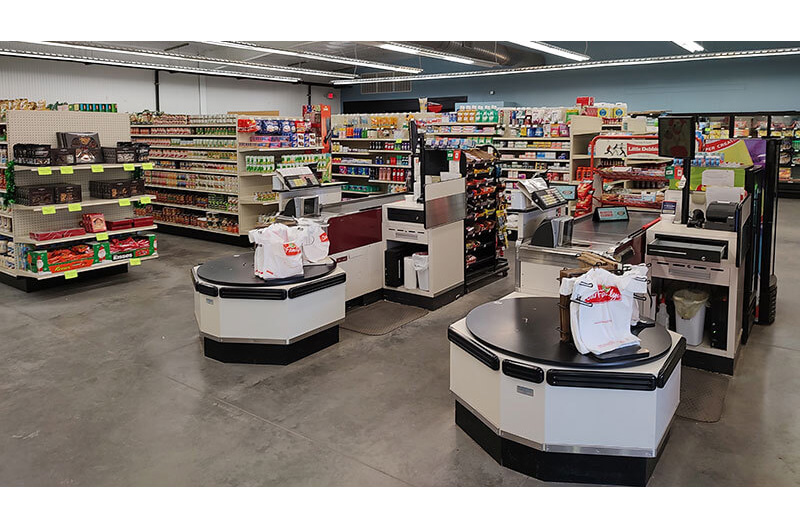The village of Utica, Nebraska, has an estimated population of 840. Located in Seward County, it’s a 45-minute drive to Lincoln, the state capital and home of the University of Nebraska. When the village lost its only grocery store about 15 years ago, it impacted the community.
About 13 years ago, when the local Catholic Church held a breakfast, it ran out of eggs. Church members ran to their homes for more. When everyone was sitting down to eat, they agreed that Utica needed a grocery store again.

According to Jenna Greckel, board member of the Centennial Market Cooperative, this was when the idea of a local grocery store was born.
Two of those present then reached out to three other couples who agreed to go in and create an LLC to build a grocery store for Utica. They partnered with an independent grocer in the nearby town of Seward, about 15 minutes away. He agreed to lease the building and operate it as a grocery store, with the idea to eventually buy the building, Greckel said.
When that grocer decided to downsize around 2021, he wanted out of the lease. At that point, the number of investors had dropped, she said.
“It left the group trying to figure out where they needed to go. At that point in time is when I came on board and bought out one of the other investors, and another one also did the same. So we had some new blood in there.”
Greckel said the investors started talking to someone in northern Nebraska who had created co-ops on an LLC level. Those talks fell through, but the ball started rolling toward the idea of a co-op.
In July 2022, the 10 investors started talking with the Nebraska Cooperative Development Group from the University of Nebraska.
“They helped guide us in that direction, and we were hoping to get started Nov. 1, 2022. We asked them what timeframe we would need to get this all going, and they said it normally takes six months to a year. We’re like, well, we want to do it in three.”
After a lot of hard work, when the Seward-operated Pack and Save closed Oct. 31, the Centennial Market Cooperative opened Nov. 1.
“We were able to transition and, let me tell you, that was a whirlwind of an experience,” Greckel said.
What made this accomplishment more remarkable was that no one in the group of investors had any experience in the grocery industry.
“That is the importance that we all saw in having a grocery store in our small town. I don’t even live in Utica, but that’s my hometown. My parents are also investors. I want to move back there some day, and I want a grocery store when I move back,” Greckel said.
Through the university, the investors had conducted a community survey in Utica to gauge the need for a grocery store. “The response was overwhelming on that,” she said.
They also took note of comments from the survey to get a better idea of what residents wanted from a grocery store. Community meetings also were held, and a Facebook page was created to offer updates on the progress of the store and to seek support.
“We presented to them what our vision was, what we were looking to fundraise because as of right now, the investor LLC group still owns the building and the co-op is leasing from them,” Greckel said.
The first goal was to raise $200,000 to cover startup costs. That goal was achieved in about a month, she said. They also were able to hire the store manager who had run the business for the Seward grocer and the staff, as well.
“With the 10 of us not having any grocery experience, that was a very important piece of the puzzle for us to move forward,” she said.
During the community meetings, Greckel said they learned just how much the manager had impacted the community. “We were floored … because we had people speaking up, talking about the importance of this grocery store.”
They heard stories of how the manager, during COVID-19 and beyond, would deliver groceries to the elderly.
“They would call up, and he would offer to deliver it to them. We had no idea. No extra charge, he would just go take it to them,” she said. “He was doing all these things that we didn’t even know.
“So it was awesome to hear all the good things going on at the grocery store, not only for us to hear it but for the whole community to hear it. It really taught them the importance of what a small-town grocery store can do and what it’s made of.”
According to Greckel, they are continuing to raise funds, with a goal of another $200,000. That will allow the co-op to buy the building from the LLC.
“Once that is done, the investment group plans to roll all their funds over into the grocery store as shares in the co-op to show that support there,” she said.
Additional funds can be used for updates or other improvements.
While the community support has been “tremendous,” Greckel noted that Utica is 15 minutes from two larger towns – Seward and York – that have Walmarts and other grocery stores. With inflation, people are looking for low prices, and independents often have trouble competing.
Greckel said the co-op recently switched wholesalers and now is a member of AWG, which she noted also is a co-op.
“We switched over in January and already are seeing some big changes to help us get that pricing down a little bit,” she said. “Now, it’s just about getting the word out that we have made some changes and that we are looking out for the community in the best way possible.”
Greckel added they are branching into offering prepared foods and partner with the grocer in Seward on some meat and produce options.
“They’ve been great in helping us transition … and we partner with them quite a bit.”
The co-op continues to be supported by the community, including the school in Utica that consolidates eight nearby towns, along with local churches and a parochial school.
“We’re very fortunate for such a small town that we can get support from those entities,” Greckel said.
Read more market profiles from The Shelby Report.

